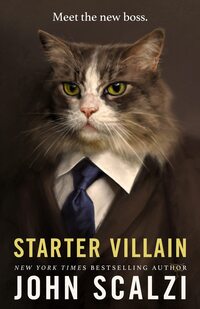The Shattering Peace by John Scalzi
 Monday, September 15, 2025 at 12:59PM
Monday, September 15, 2025 at 12:59PM 
Published by Tor Books on September 16, 2025
The Shattering Peace is the seventh novel set in John Scalzi’s Old Man’s War universe. It works as a standalone for readers who aren’t familiar with the series.
Scalzi typically explores interesting questions. The question in The Shattering Peace is whether some technological advances are so dangerous that humans can’t be trusted with them. People are currently having that very debate about AI, a discussion that seems to have replaced concern about self-replicating nanotechnology. The technology at issue in The Shattering Peace is a form of transportation (a skip drive) that can send an asteroid into a planet’s orbit, causing a collision that will destroy the planet.
Skip drives are relatively tame technology in the future that Scalzi imagines. They cause a starship to disappear from one universe and appear in another, nearly identical universe. Because the universes are so similar, travelers don’t notice that they are in a different one. They replace themselves and in turn are replaced by versions of themselves in the universe they left. Skip drives won’t work in a gravity well, so they can’t be used near a planet. Nor can they cause a ship to skip into a universe that is significantly different from the one they leave. Until now.
Humans are still living on Earth in the Old Man’s War universe, but they have populated other, more important worlds that comprise the Colonial Union. Some alien species have formed a government called the Conclave. Among them are the Obin, a species that had no consciousness until the Colonial Union gave it to them. The Obin can turn off their emotions when they prove to be troublesome. I know some people like that.
The Colonial Union, Earth, and the Conclave entered into a treaty that limits further colonization. The treaty ended wars among species that are competing for resources that newly colonized planets provide. I’m a bit skeptical that it’s necessary to colonize planets to exploit their resources, given the vast resources available from planets, moons, and asteroids that can presumably be mined without inhabiting them, but that’s the premise.
Not a party to the treaty are the Consu, an alien race that is technologically superior to other species and regards every other race as culturally and morally inferior. The Consu are hard to kill (they have the usual alien carapace and bladed limbs) and they value their death rituals.
Scalzi skimped on the creativity when he created the aliens in this series. The Consu could be extras in a low-budget sf film. The other alien races are barely described in The Shattering Peace, although readers who have read every novel in the series will know something about them.
Unbeknownst to most, humans and the Conclave aliens have skirted the treaty by mutually colonizing an asteroid in an effort to determine whether cooperation is possible. The asteroid is not yet self-sufficient and therefore depends on supply ship deliveries to assure its survival.
As the story opens, the asteroid has disappeared. Probes have not detected the debris field that should exist if the asteroid had been destroyed. If the colony hasn’t been destroyed, the colonists will soon starve if they aren’t rescued.
Gretchen Trujillo, the novel’s protagonist, works for the Colonial Union Diplomatic Security Force. There’s no particular reason to send her to search for the missing asteroid, but her father negotiated the deal that resulted in the asteroid’s colonization, so nepotism contributes to Gretchen’s assignment. Also, Gretchen’s ex-boyfriend was assigned to the asteroid and her dad thought Gretchen might want to shag him again.
The plot sends Gretchen and a team of scientists to the asteroid’s last location. It isn’t there, but the scientists find a Consu in a container where the asteroid used to be. Gretchen strikes a deal to protect the Consu from other Consu who arrive with malicious intent. In exchange, the Consu in the container agrees to share the location of the missing asteroid. Battles ensue. Gretchen has been trained to fight by the Obin (one of them is her bodyguard) and she plays a role in the action scenes. She will eventually be challenged to a duel by a Consu.
Without revealing too much, the most interesting aspect of the story involves the Consu’s discovery of new skip drive technology that overcomes the limitations of existing inter-universe travel. Since the tech could be used to destroy worlds, it probably well be. Scalzi deals with that predicament in a clever way to produce a happy ending.
The rest of the story is standard fare, but Scalzi is always a good storyteller. The action is credible, the plot moves swiftly, and Gretchen gets laid, so good for her. Scalzi doesn’t explore his characters in any great depth, a missed opportunity when it comes to aliens who can turn off their consciousness. While the novel is fun, it doesn’t live up to the standard that Scalzi set in Old Man’s War, the first and best novel in the series.
RECOMMENDED



